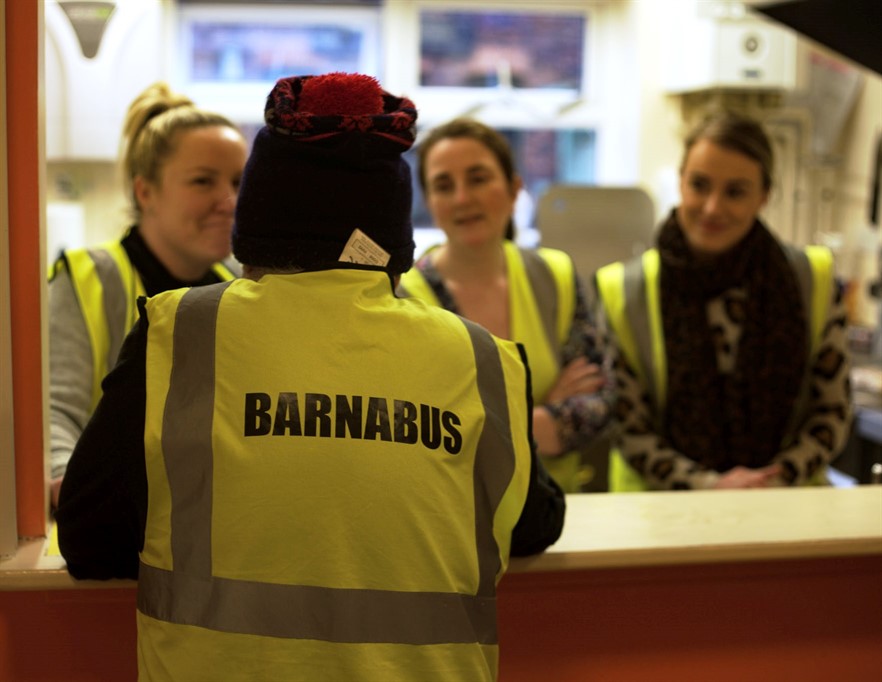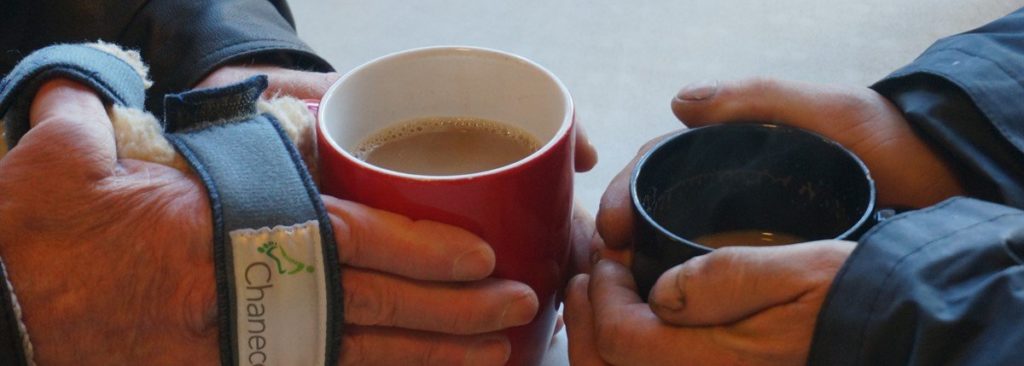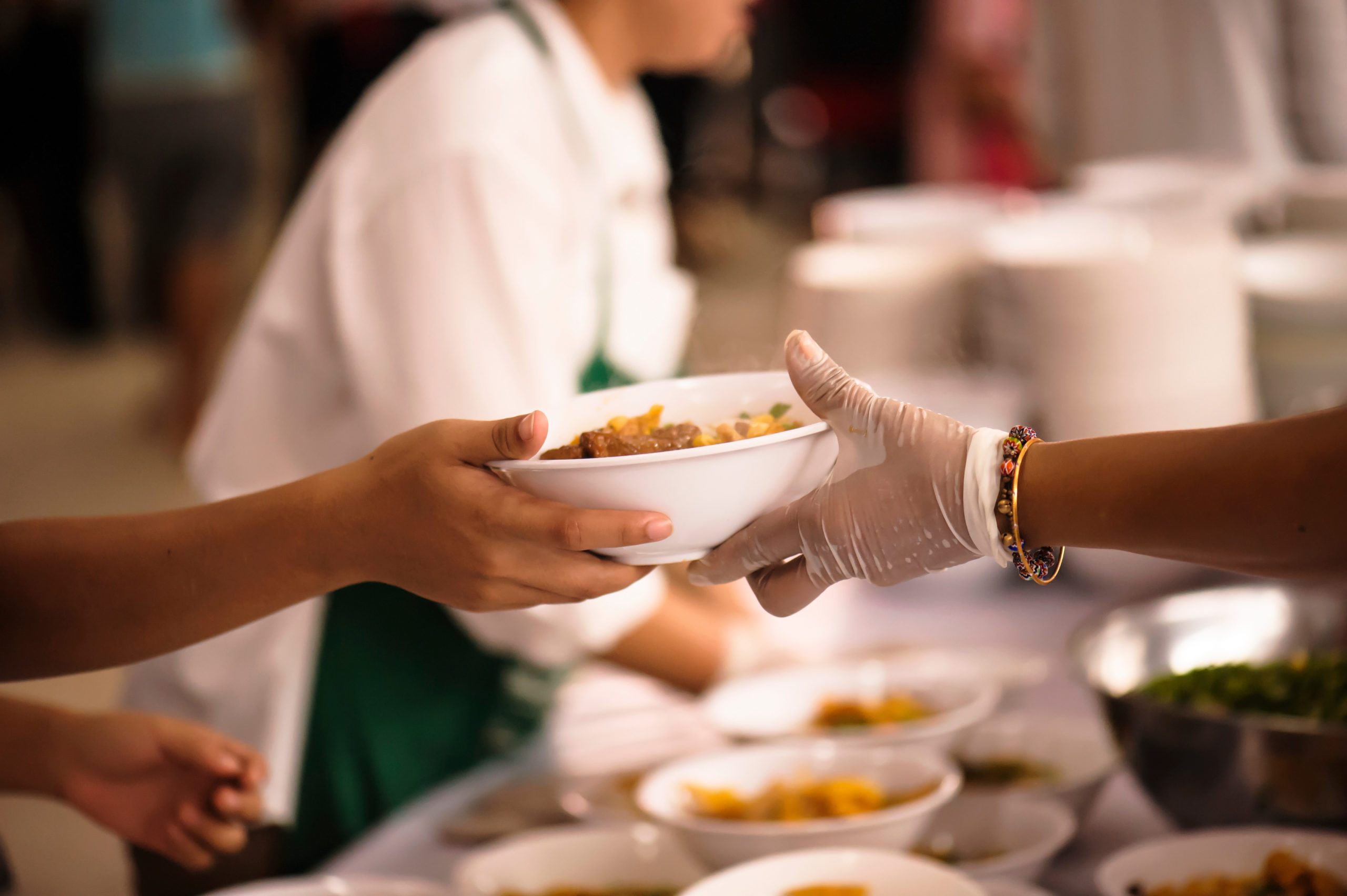We started WellBox in 2020 during the Covid pandemic. For each food & drink WellBox sold, we donate one meal, or one meal worth of provisions to someone in need.
Our goal was to create a business model where everyone could benefit:
- The Community benefits directly through the donation, helping our charity partners at a time when donations are most needed.
- Employees benefit by receiving a small token of appreciation that goes a long way towards boosting their mental wellbeing. They also see which charity your donation has supported and benefit from knowing their company has directly helped someone in need.
- Employers benefit by doing good in their local community, contributing to CSR targets at a time when opportunities to do so are scarce, and knowing their staff will appreciate the gesture in a difficult time.
One of the first charities that we partnered with for this was Barnabus, who are based in our hometown of Manchester.
We decided to catch up with the team at Barnabus to find out how the donations that our customers have made are used.
What does Barnabus do with the donations?
Every sale of a WellBox provides a meal for rough sleepers and people experiencing homelessness but that isn’t the end of this story. Ultimately and vitally the wrap-around support that we provide while we are helping someone practically empowers those we support into new hope, new homes, and lives away from the streets.
During this Covid-19 crisis and lockdowns, our priority has been referring rough sleepers into hotels and other accommodation in the city so that they can self-isolate and stay safe, ensuring they receive much-needed food, other essential items, and mental and emotional support from our support team.
At the start of the first lockdown, Barnabus totally changed its operations to lead an initiative cooking meals for rough sleepers housed by the councils in hotels throughout Manchester as part of the ‘Everybody In’ scheme. Over a period of 3 months, we cooked and delivered 40,000 meals ensuring people experiencing homelessness could stay safe and have the dignity and support they needed.
In August we were able to reopen our Beacon Support Centre, offering a breakfast, hot shower, and clean clothes which can mean so much to the people we help. The Beacon also offers essential health care through two nurses from the Urban Village Medical Practice, helping people to manage existing conditions such as diabetes or epilepsy or illnesses they have sustained on the street. We see our Beacon Support Centre and the food we offer as the gateway for our Support team to build relationships with rough sleepers and help them move on into accommodation.
Our Support team are all experienced in helping people with complex needs; we offer confidential help and advice and trauma-informed care; putting together a support plan that’s tailored to each and every person we help. Whether it’s finding safe shelter, helping them get support with addictions, or mental health needs or perhaps helping them to reconnect with family – we do not give up until our friends are living independent, fulfilling lives. We also work with our corporate partners to establish employment opportunities or training.
Our Resettlement Worker provides support to empower our friends to move on from emergency or supported accommodation into our Tenancy resettlement program so that they can start to gain the confidence and life skills to have their own tenancies and homes and feel connected and part of their local community.
During the year we’ve also helped to run a collaborative early morning breakfast project for people sleeping rough and during emergency cold weather provision we have again provided food to those in accommodation.

What initiatives or projects do the donations support?
Barnabus believes in a holistic and health and wellbeing approach to supporting our friends along every step of their journey. Our engagement workers at the Beacon Support Centre work predominantly with people who are still sleeping on the streets and need referrals to emergency accommodation and help with food, clothing, and their immediate physical wellbeing. The offer of a meal and basic care has always been a great way for us to encourage our friends to engage with our support team and build vital trust.
Our caseworkers are the next step for our friends, these are mostly people in emergency and temporary accommodation who need in-depth support with their mental health, addictions, trauma, long-term accommodation, employment, benefits, and other key steps towards building a new life.
The final step is with our resettlement team who work long-term with our friends finding them a tenancy and supporting them through the move-in process and beyond. Council tax, registering with a GP, bills, dealing with neighbours, and many other things can be very stressful, especially for someone who is still adapting to a life away from the streets and may be dealing with other traumas too.
Could you let us know a success story of what Barnabus has achieved recently?
Here is a great example of the varied work our team does and our ethos of working with someone for a long time and never giving up on them.
Huge steps for our friend
Andy* first came to Barnabus in 2015. He grew up in care and then became homeless, which he continued to be for over 10 years.
Sadly, he had never stayed in accommodation for very long. He has multiple complex needs and a history of not engaging well with support services. He would access Barnabus for basic needs and food but wouldn’t stick around.
At first, this limited our ability to work with him. Yet now, Andy is making huge strides towards a fresh start. This is his story.
A real turning point
Last year Andy had some trouble with his benefits, so he came to our support team for help. This provided us with the opportunity to work together on a deeper level than we had ever been able to before. Our support worker Jenna managed to help him with the financial abuse he was experiencing and encouraged him to move into supported accommodation. Not long after taking Andy through the referral process, Jenna received the good news: Andy had been accepted.
At the time of writing, Andy has been staying in his supported accommodation for five months. He’s putting on weight and looking a lot healthier. He also engages very well with Jenna and rings her regularly to keep us all updated on how he’s doing. Jenna has been able to continue to work with him while he developed his trust in the accommodation staff, and he is now in a place where he feels he can work with them too.
Looking ahead
Andy can now have a full conversation while maintaining eye contact. This time last year, he couldn’t look anyone in the eye at all – which is a sign of just how far he has come! It’s also been an important factor in us being able to have honest, non-judgmental conversations with him about his drug use. Initially, Andy said he was not interested in stopping taking drugs. But by advising him that, when the time comes and he is ready to look at support options, we would be happy to help, he amazingly has recently asked about accessing rehab. He has now had a few appointments and is also taking medication to help with his mental health.
Barnabus has also helped Andy reconnect with a family member which, given that he has little local family support and has felt extremely lonely at times, has been huge for him.
Help others make their next step
Andy has come on so far recently and has developed the confidence that he had lost along the way. He gives us so much hope and reminds us why we will never give up on someone. Whoever they are, we will always be ready to help them – no matter how long we have to wait.

What are the plans for the future with Barnabus?
With COVID cases falling and restrictions planned to be relaxed, we are excited for the opportunity to expand the services we can offer. We will still work on a one-to-one basis with those we support but when we are able we have plans for group sessions to take place in the Beacon that would help our friends deal with their addictions and traumas, health needs, and also skill development.
We are also looking to expand our resettlement programme not only to work with more people in the scheme but to also better support them to integrate with their communities, they may want to connect with a local church or community, creative or sport groups that can help our friends combat the loneliness and stress of moving away from their old lives into a new area, new home, and new life.

